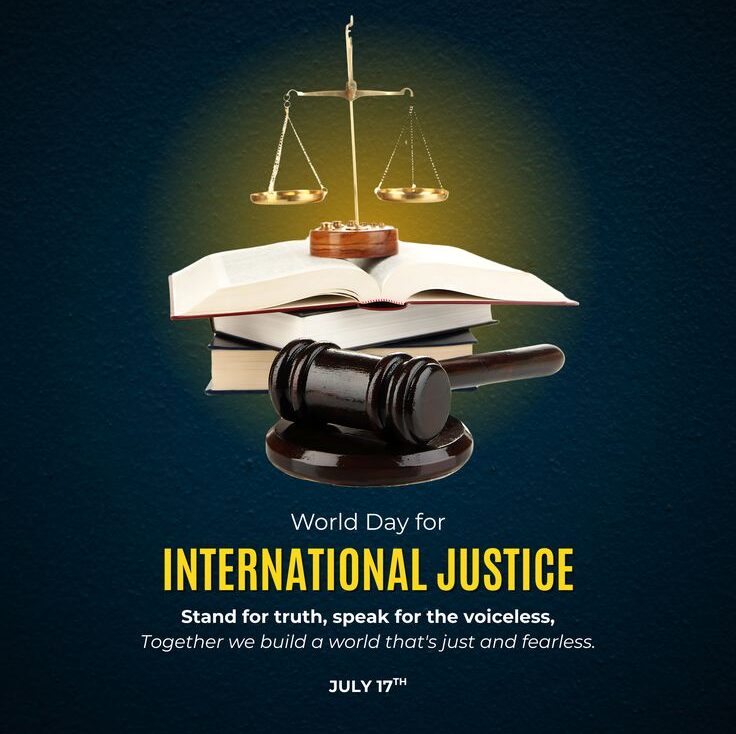🕊️ World Day for International Justice: Honoring the Fight Against Injustice, Globally
In a world where injustice often steals peace, dignity, and lives, justice becomes more than a principle—it becomes a promise. Every year on July 17, the global community observes the World Day for International Justice—a moment to reflect, act, and recommit to the cause of international criminal accountability and human rights.
- 🌍 What is World Day for International Justice?
- 📜 History of World Day for International Justice
- 🧾 Timeline: Milestones of International Justice
- 🔍 10 Facts About World Day for International Justice
- 🤔 FAQs – World Day for International Justice
- Q1: Why is July 17 significant?
- Q2: What is the Rome Statute?
- Q3: What kind of crimes does the ICC prosecute?
- Q4: Who celebrates this day?
- Q5: Is the ICC part of the United Nations?
- 🎯 Significance of the Day
- ✅ A Tribute to Victims
- ✅ A Call for Accountability
- ✅ A Reminder of Global Unity
- ✅ An Educational Opportunity
- 🎉 How is World Day for International Justice Observed?
- 📢 1. Advocacy Campaigns
- 🎬 2. Public Events & Seminars
- 📺 3. Media Coverage
- 📲 4. Social Media Movements
- 👨🎓 5. Educational Programs
- 💬 Wishing Messages and Quotes
- 🌐 Importance in Our Daily Lives
- 🧭 7 Powerful Truths Why This Day Matters More Than Ever
- 🧠 Conclusion: Justice Is Not Optional—It Is Essential
Whether it’s holding war criminals responsible, protecting victims of genocide, or advocating for fair trials, this day reminds us that no one is above the law, and justice must transcend borders.
Let’s explore the history, significance, powerful facts, common questions, timeline, and daily life impact of this important global observance.
🌍 What is World Day for International Justice?
World Day for International Justice, also called International Justice Day, is celebrated annually on July 17 to commemorate the adoption of the Rome Statute, which established the International Criminal Court (ICC).
📌 Quick Summary:
Date: July 17
Observed by: United Nations, International Criminal Court (ICC), human rights organizations
Aim: To promote international criminal justice, prevent serious crimes, and support victims of injustice
Also Known As: International Criminal Justice Day
📜 History of World Day for International Justice
🧭 Origins of the Day
The roots of this day lie in one of the most significant legal advancements in human history—the creation of the Rome Statute in 1998, the founding treaty of the International Criminal Court (ICC).
17 July 1998 – 120 states adopted the Rome Statute in Rome, Italy.
The treaty led to the establishment of the ICC in 2002, based in The Hague, Netherlands.
The ICC became the first permanent international court to prosecute crimes such as genocide, war crimes, crimes against humanity, and crimes of aggression.
🕊️ First Observance
The first World Day for International Justice was celebrated in 1999, just one year after the Rome Statute was signed.
Over the years, it has become a global movement supported by activists, governments, legal experts, and survivors.
🧾 Timeline: Milestones of International Justice
| Year | Event |
|---|---|
| 1945 | Nuremberg & Tokyo trials held after WWII |
| 1948 | Genocide Convention adopted by the UN |
| 1993 | International Criminal Tribunal for the former Yugoslavia established |
| 1994 | International Criminal Tribunal for Rwanda established |
| 1998 | Rome Statute adopted (July 17) |
| 2002 | ICC officially established |
| 2010 | Crime of aggression added to ICC jurisdiction |
| 2025 | Over 123 countries are parties to the Rome Statute |
🔍 10 Facts About World Day for International Justice
🌐 Over 123 nations are signatories to the Rome Statute.
🧑⚖️ The International Criminal Court has tried former heads of state, warlords, and military commanders.
🌍 ICC focuses on the most serious crimes: genocide, war crimes, and crimes against humanity.
📜 The ICC is complementary, meaning it only acts when national courts cannot or will not.
🕊️ The ICC has victim participation rights, allowing victims to share their stories during trials.
🌎 July 17 is a symbolic day recognized by NGOs and legal institutions worldwide.
🚨 Some major powers, like USA, China, Russia, are not party to the Rome Statute.
👥 The ICC operates independently of the United Nations.
📣 World Day for International Justice often features public campaigns, documentaries, panel discussions, and survivor testimonials.
🔒 The ICC can issue international arrest warrants against fugitives.
🤔 FAQs – World Day for International Justice
Q1: Why is July 17 significant?
A: It marks the adoption of the Rome Statute, establishing the ICC—a major step in global justice.
Q2: What is the Rome Statute?
A: It’s the treaty that created the International Criminal Court (ICC) in 2002.
Q3: What kind of crimes does the ICC prosecute?
A: Genocide, war crimes, crimes against humanity, and crimes of aggression.
Q4: Who celebrates this day?
A: Legal institutions, governments, NGOs, survivors, activists, and global citizens.
Q5: Is the ICC part of the United Nations?
A: No, it’s independent but works in collaboration with UN agencies.
🎯 Significance of the Day
World Day for International Justice reminds us that justice delayed is not always justice denied—but it must never be forgotten. It serves as:
✅ A Tribute to Victims
A recognition of millions of victims of war, genocide, sexual violence, torture, and political persecution.
✅ A Call for Accountability
No person, regardless of power or position, should be immune from prosecution when committing grave crimes.
✅ A Reminder of Global Unity
Justice is a universal human right, not confined by nationality, politics, or wealth.
✅ An Educational Opportunity
It informs the public about international law, human rights, and the justice process.
🎉 How is World Day for International Justice Observed?
📢 1. Advocacy Campaigns
Human rights groups run petitions, awareness drives, and online campaigns highlighting war crimes and human rights abuses.
🎬 2. Public Events & Seminars
Universities and international law centers conduct lectures, panel discussions, and exhibitions.
📺 3. Media Coverage
News agencies air documentaries, survivor stories, and legal commentary.
📲 4. Social Media Movements
People share posts using hashtags like #JusticeMatters, #ICC, #WorldJusticeDay to build awareness.
👨🎓 5. Educational Programs
Schools and colleges organize debates, quizzes, or workshops on global justice, legal rights, and international law.
💬 Wishing Messages and Quotes
“🌍 Justice is not a privilege. It is a right. Happy World Day for International Justice.”
“🕊️ On this day, we honor every soul who believed in truth over tyranny.”
“📜 Let the law roar louder than the silence of suffering.”
“⚖️ Justice knows no boundaries—only responsibility. Celebrate fairness today.”
“🙏 May the voice of the victims always be louder than the noise of war.”
🌐 Importance in Our Daily Lives
While international crimes may seem distant, justice touches us all in ways we may not always recognize.
🔹 Promotes Peace
Justice systems help prevent conflicts and retaliations, creating a more peaceful global society.
🔹 Protects Rights
Whether you’re a citizen or a refugee, basic human rights depend on enforceable laws.
🔹 Encourages Trust
Transparent justice fosters trust in government, democracy, and institutions.
🔹 Empowers the Weak
The ICC gives a platform to the voiceless, protecting victims who are often ignored.
🔹 Prevents Future Crimes
By holding perpetrators accountable, it sends a message to future offenders that they will be prosecuted.
🧭 7 Powerful Truths Why This Day Matters More Than Ever
Injustice Still Exists: War crimes and mass atrocities continue globally.
Victims Need Healing: Justice helps closure and healing for survivors and families.
Laws Without Borders: It reinforces international cooperation for justice.
Silence Enables Tyranny: Speaking out on July 17 adds momentum to global voices.
It Educates Generations: A great way to teach youth about ethics and global citizenship.
Courage Over Comfort: Justice requires bravery, even when uncomfortable.
Global Unity for Peace: It reminds us that humanity is one global family, deserving of fairness.
🧠 Conclusion: Justice Is Not Optional—It Is Essential
World Day for International Justice is more than just a date—it is a beacon of hope for a fairer future. While the wheels of justice may turn slowly, this observance ensures they never stop turning.
In a world riddled with wars, corruption, discrimination, and power abuse, the commitment to truth, fairness, and human dignity must remain stronger than ever.
Justice isn’t just a courtroom issue—it’s a human one. Let us champion it, not just on July 17, but every day.








